Entrepreneurship Research and Theories
VerifiedAdded on 2020/07/23
|13
|4477
|56
AI Summary
This assignment provides a detailed analysis of entrepreneurship research and theories, covering various aspects such as startup growth, corporate entrepreneurship, and innovation. It includes references to notable publications and studies on the subject, offering a comprehensive overview for students and researchers in the field.
Contribute Materials
Your contribution can guide someone’s learning journey. Share your
documents today.

ENTREPRENEURSHIP
AND
SMALL-BUSINESS
MANAGEMENT
AND
SMALL-BUSINESS
MANAGEMENT
Secure Best Marks with AI Grader
Need help grading? Try our AI Grader for instant feedback on your assignments.
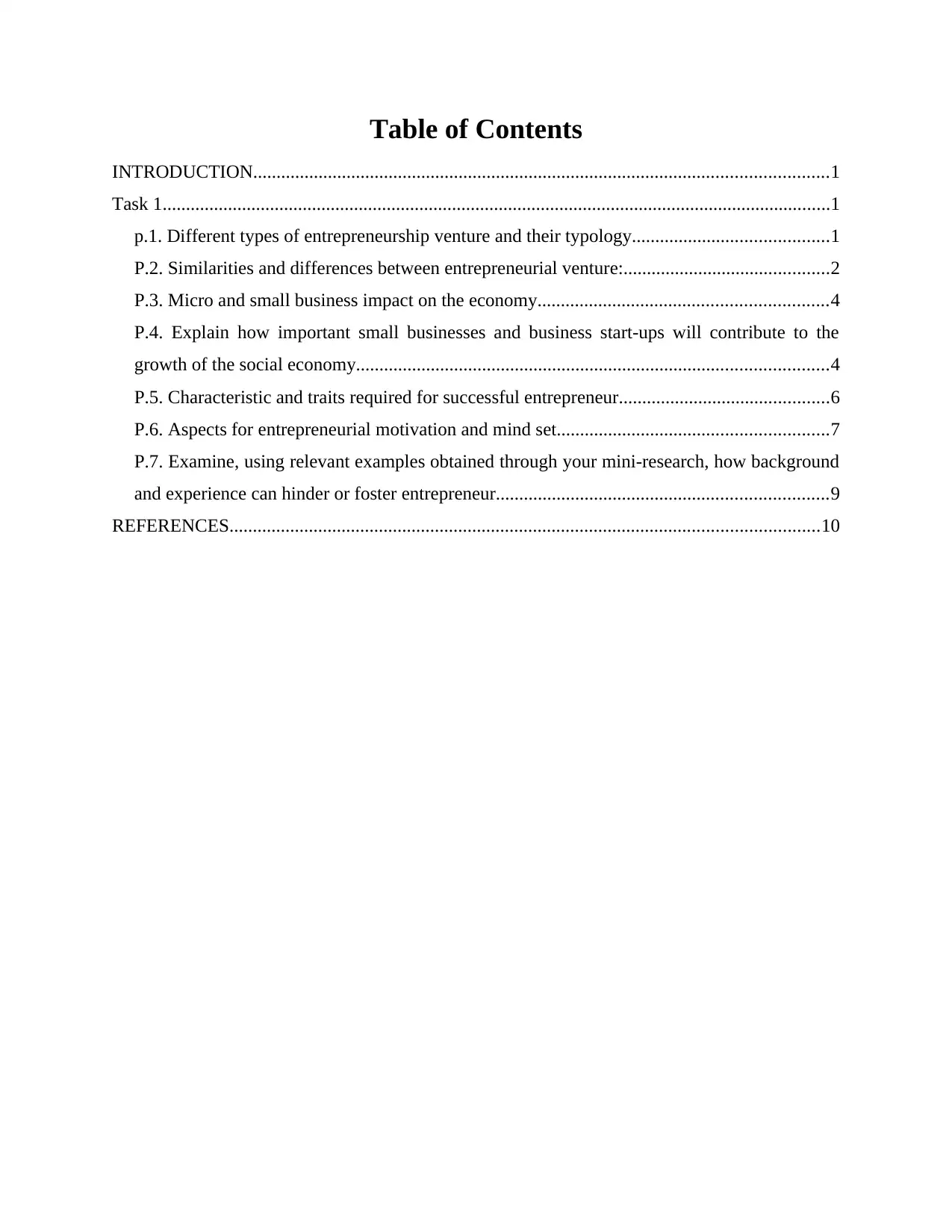
Table of Contents
INTRODUCTION...........................................................................................................................1
Task 1...............................................................................................................................................1
p.1. Different types of entrepreneurship venture and their typology..........................................1
P.2. Similarities and differences between entrepreneurial venture:............................................2
P.3. Micro and small business impact on the economy..............................................................4
P.4. Explain how important small businesses and business start-ups will contribute to the
growth of the social economy.....................................................................................................4
P.5. Characteristic and traits required for successful entrepreneur.............................................6
P.6. Aspects for entrepreneurial motivation and mind set..........................................................7
P.7. Examine, using relevant examples obtained through your mini-research, how background
and experience can hinder or foster entrepreneur.......................................................................9
REFERENCES..............................................................................................................................10
INTRODUCTION...........................................................................................................................1
Task 1...............................................................................................................................................1
p.1. Different types of entrepreneurship venture and their typology..........................................1
P.2. Similarities and differences between entrepreneurial venture:............................................2
P.3. Micro and small business impact on the economy..............................................................4
P.4. Explain how important small businesses and business start-ups will contribute to the
growth of the social economy.....................................................................................................4
P.5. Characteristic and traits required for successful entrepreneur.............................................6
P.6. Aspects for entrepreneurial motivation and mind set..........................................................7
P.7. Examine, using relevant examples obtained through your mini-research, how background
and experience can hinder or foster entrepreneur.......................................................................9
REFERENCES..............................................................................................................................10
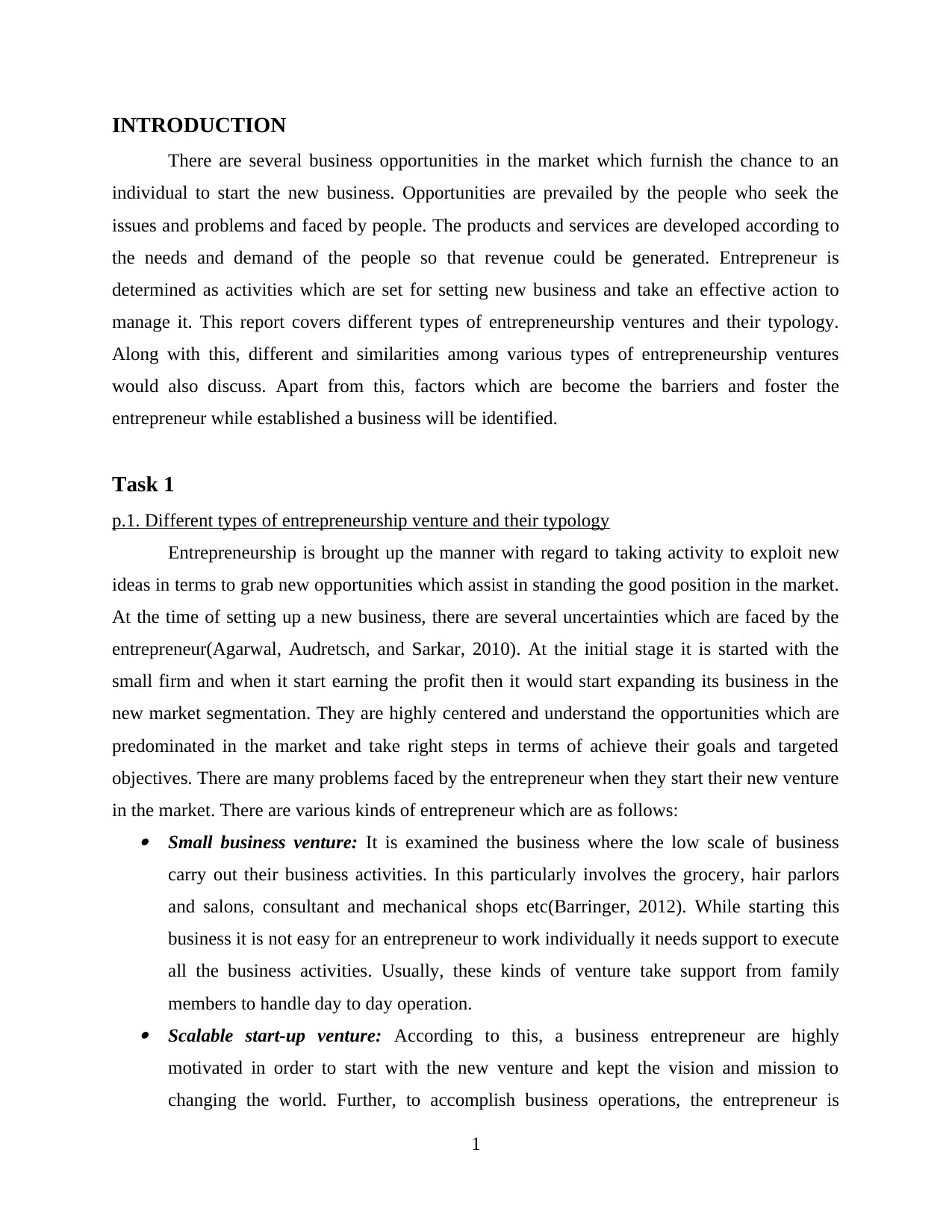
INTRODUCTION
There are several business opportunities in the market which furnish the chance to an
individual to start the new business. Opportunities are prevailed by the people who seek the
issues and problems and faced by people. The products and services are developed according to
the needs and demand of the people so that revenue could be generated. Entrepreneur is
determined as activities which are set for setting new business and take an effective action to
manage it. This report covers different types of entrepreneurship ventures and their typology.
Along with this, different and similarities among various types of entrepreneurship ventures
would also discuss. Apart from this, factors which are become the barriers and foster the
entrepreneur while established a business will be identified.
Task 1
p.1. Different types of entrepreneurship venture and their typology
Entrepreneurship is brought up the manner with regard to taking activity to exploit new
ideas in terms to grab new opportunities which assist in standing the good position in the market.
At the time of setting up a new business, there are several uncertainties which are faced by the
entrepreneur(Agarwal, Audretsch, and Sarkar, 2010). At the initial stage it is started with the
small firm and when it start earning the profit then it would start expanding its business in the
new market segmentation. They are highly centered and understand the opportunities which are
predominated in the market and take right steps in terms of achieve their goals and targeted
objectives. There are many problems faced by the entrepreneur when they start their new venture
in the market. There are various kinds of entrepreneur which are as follows: Small business venture: It is examined the business where the low scale of business
carry out their business activities. In this particularly involves the grocery, hair parlors
and salons, consultant and mechanical shops etc(Barringer, 2012). While starting this
business it is not easy for an entrepreneur to work individually it needs support to execute
all the business activities. Usually, these kinds of venture take support from family
members to handle day to day operation. Scalable start-up venture: According to this, a business entrepreneur are highly
motivated in order to start with the new venture and kept the vision and mission to
changing the world. Further, to accomplish business operations, the entrepreneur is
1
There are several business opportunities in the market which furnish the chance to an
individual to start the new business. Opportunities are prevailed by the people who seek the
issues and problems and faced by people. The products and services are developed according to
the needs and demand of the people so that revenue could be generated. Entrepreneur is
determined as activities which are set for setting new business and take an effective action to
manage it. This report covers different types of entrepreneurship ventures and their typology.
Along with this, different and similarities among various types of entrepreneurship ventures
would also discuss. Apart from this, factors which are become the barriers and foster the
entrepreneur while established a business will be identified.
Task 1
p.1. Different types of entrepreneurship venture and their typology
Entrepreneurship is brought up the manner with regard to taking activity to exploit new
ideas in terms to grab new opportunities which assist in standing the good position in the market.
At the time of setting up a new business, there are several uncertainties which are faced by the
entrepreneur(Agarwal, Audretsch, and Sarkar, 2010). At the initial stage it is started with the
small firm and when it start earning the profit then it would start expanding its business in the
new market segmentation. They are highly centered and understand the opportunities which are
predominated in the market and take right steps in terms of achieve their goals and targeted
objectives. There are many problems faced by the entrepreneur when they start their new venture
in the market. There are various kinds of entrepreneur which are as follows: Small business venture: It is examined the business where the low scale of business
carry out their business activities. In this particularly involves the grocery, hair parlors
and salons, consultant and mechanical shops etc(Barringer, 2012). While starting this
business it is not easy for an entrepreneur to work individually it needs support to execute
all the business activities. Usually, these kinds of venture take support from family
members to handle day to day operation. Scalable start-up venture: According to this, a business entrepreneur are highly
motivated in order to start with the new venture and kept the vision and mission to
changing the world. Further, to accomplish business operations, the entrepreneur is
1
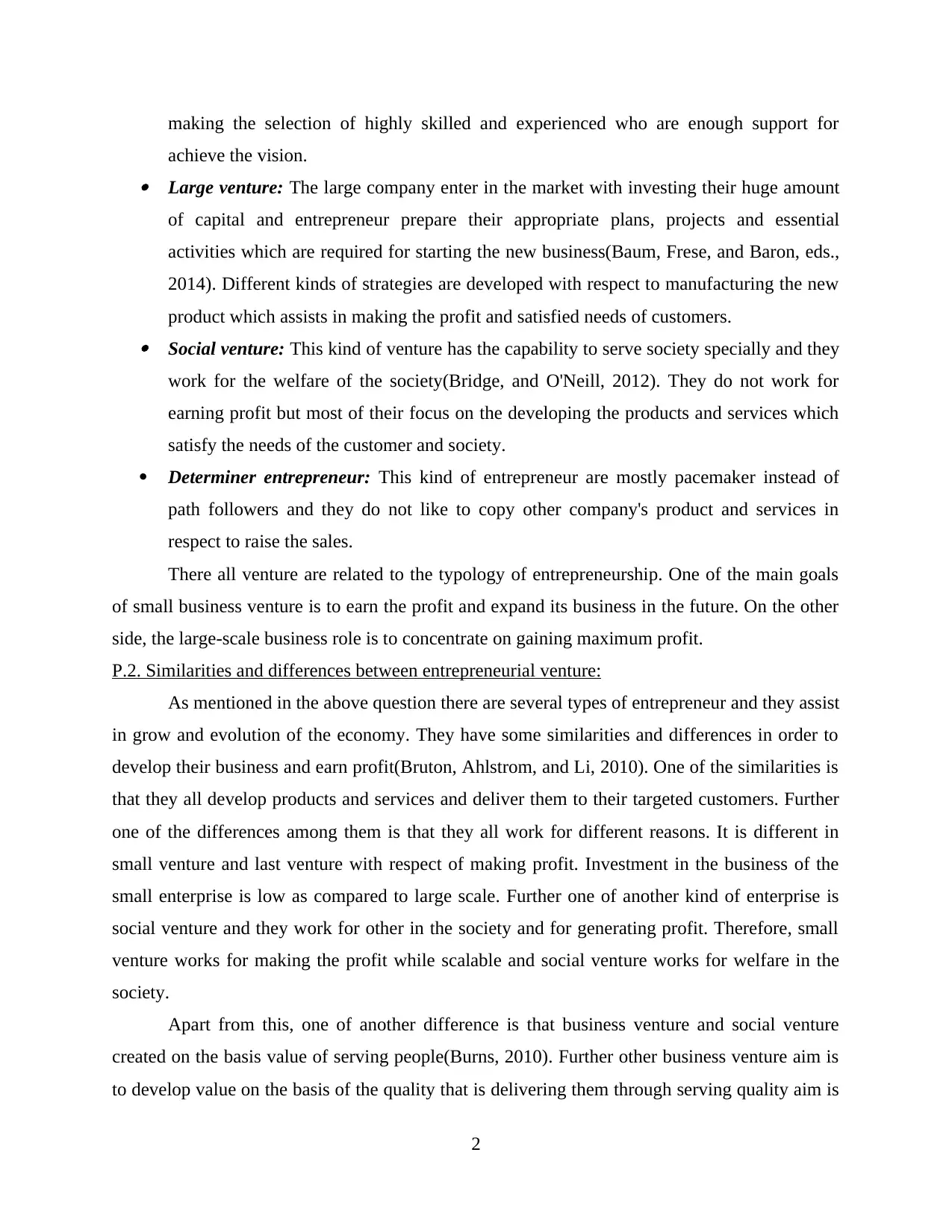
making the selection of highly skilled and experienced who are enough support for
achieve the vision. Large venture: The large company enter in the market with investing their huge amount
of capital and entrepreneur prepare their appropriate plans, projects and essential
activities which are required for starting the new business(Baum, Frese, and Baron, eds.,
2014). Different kinds of strategies are developed with respect to manufacturing the new
product which assists in making the profit and satisfied needs of customers. Social venture: This kind of venture has the capability to serve society specially and they
work for the welfare of the society(Bridge, and O'Neill, 2012). They do not work for
earning profit but most of their focus on the developing the products and services which
satisfy the needs of the customer and society.
Determiner entrepreneur: This kind of entrepreneur are mostly pacemaker instead of
path followers and they do not like to copy other company's product and services in
respect to raise the sales.
There all venture are related to the typology of entrepreneurship. One of the main goals
of small business venture is to earn the profit and expand its business in the future. On the other
side, the large-scale business role is to concentrate on gaining maximum profit.
P.2. Similarities and differences between entrepreneurial venture:
As mentioned in the above question there are several types of entrepreneur and they assist
in grow and evolution of the economy. They have some similarities and differences in order to
develop their business and earn profit(Bruton, Ahlstrom, and Li, 2010). One of the similarities is
that they all develop products and services and deliver them to their targeted customers. Further
one of the differences among them is that they all work for different reasons. It is different in
small venture and last venture with respect of making profit. Investment in the business of the
small enterprise is low as compared to large scale. Further one of another kind of enterprise is
social venture and they work for other in the society and for generating profit. Therefore, small
venture works for making the profit while scalable and social venture works for welfare in the
society.
Apart from this, one of another difference is that business venture and social venture
created on the basis value of serving people(Burns, 2010). Further other business venture aim is
to develop value on the basis of the quality that is delivering them through serving quality aim is
2
achieve the vision. Large venture: The large company enter in the market with investing their huge amount
of capital and entrepreneur prepare their appropriate plans, projects and essential
activities which are required for starting the new business(Baum, Frese, and Baron, eds.,
2014). Different kinds of strategies are developed with respect to manufacturing the new
product which assists in making the profit and satisfied needs of customers. Social venture: This kind of venture has the capability to serve society specially and they
work for the welfare of the society(Bridge, and O'Neill, 2012). They do not work for
earning profit but most of their focus on the developing the products and services which
satisfy the needs of the customer and society.
Determiner entrepreneur: This kind of entrepreneur are mostly pacemaker instead of
path followers and they do not like to copy other company's product and services in
respect to raise the sales.
There all venture are related to the typology of entrepreneurship. One of the main goals
of small business venture is to earn the profit and expand its business in the future. On the other
side, the large-scale business role is to concentrate on gaining maximum profit.
P.2. Similarities and differences between entrepreneurial venture:
As mentioned in the above question there are several types of entrepreneur and they assist
in grow and evolution of the economy. They have some similarities and differences in order to
develop their business and earn profit(Bruton, Ahlstrom, and Li, 2010). One of the similarities is
that they all develop products and services and deliver them to their targeted customers. Further
one of the differences among them is that they all work for different reasons. It is different in
small venture and last venture with respect of making profit. Investment in the business of the
small enterprise is low as compared to large scale. Further one of another kind of enterprise is
social venture and they work for other in the society and for generating profit. Therefore, small
venture works for making the profit while scalable and social venture works for welfare in the
society.
Apart from this, one of another difference is that business venture and social venture
created on the basis value of serving people(Burns, 2010). Further other business venture aim is
to develop value on the basis of the quality that is delivering them through serving quality aim is
2
Secure Best Marks with AI Grader
Need help grading? Try our AI Grader for instant feedback on your assignments.
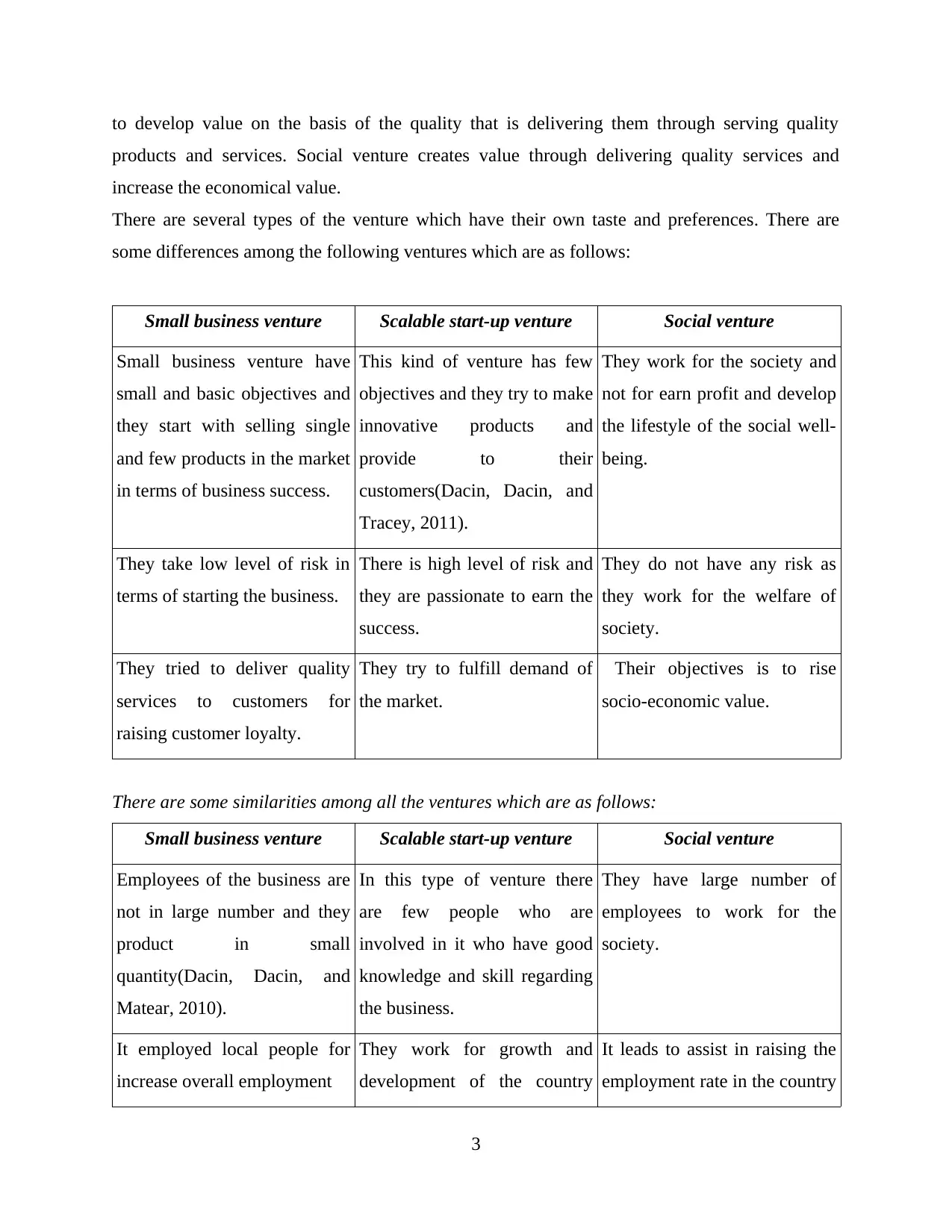
to develop value on the basis of the quality that is delivering them through serving quality
products and services. Social venture creates value through delivering quality services and
increase the economical value.
There are several types of the venture which have their own taste and preferences. There are
some differences among the following ventures which are as follows:
Small business venture Scalable start-up venture Social venture
Small business venture have
small and basic objectives and
they start with selling single
and few products in the market
in terms of business success.
This kind of venture has few
objectives and they try to make
innovative products and
provide to their
customers(Dacin, Dacin, and
Tracey, 2011).
They work for the society and
not for earn profit and develop
the lifestyle of the social well-
being.
They take low level of risk in
terms of starting the business.
There is high level of risk and
they are passionate to earn the
success.
They do not have any risk as
they work for the welfare of
society.
They tried to deliver quality
services to customers for
raising customer loyalty.
They try to fulfill demand of
the market.
Their objectives is to rise
socio-economic value.
There are some similarities among all the ventures which are as follows:
Small business venture Scalable start-up venture Social venture
Employees of the business are
not in large number and they
product in small
quantity(Dacin, Dacin, and
Matear, 2010).
In this type of venture there
are few people who are
involved in it who have good
knowledge and skill regarding
the business.
They have large number of
employees to work for the
society.
It employed local people for
increase overall employment
They work for growth and
development of the country
It leads to assist in raising the
employment rate in the country
3
products and services. Social venture creates value through delivering quality services and
increase the economical value.
There are several types of the venture which have their own taste and preferences. There are
some differences among the following ventures which are as follows:
Small business venture Scalable start-up venture Social venture
Small business venture have
small and basic objectives and
they start with selling single
and few products in the market
in terms of business success.
This kind of venture has few
objectives and they try to make
innovative products and
provide to their
customers(Dacin, Dacin, and
Tracey, 2011).
They work for the society and
not for earn profit and develop
the lifestyle of the social well-
being.
They take low level of risk in
terms of starting the business.
There is high level of risk and
they are passionate to earn the
success.
They do not have any risk as
they work for the welfare of
society.
They tried to deliver quality
services to customers for
raising customer loyalty.
They try to fulfill demand of
the market.
Their objectives is to rise
socio-economic value.
There are some similarities among all the ventures which are as follows:
Small business venture Scalable start-up venture Social venture
Employees of the business are
not in large number and they
product in small
quantity(Dacin, Dacin, and
Matear, 2010).
In this type of venture there
are few people who are
involved in it who have good
knowledge and skill regarding
the business.
They have large number of
employees to work for the
society.
It employed local people for
increase overall employment
They work for growth and
development of the country
It leads to assist in raising the
employment rate in the country
3
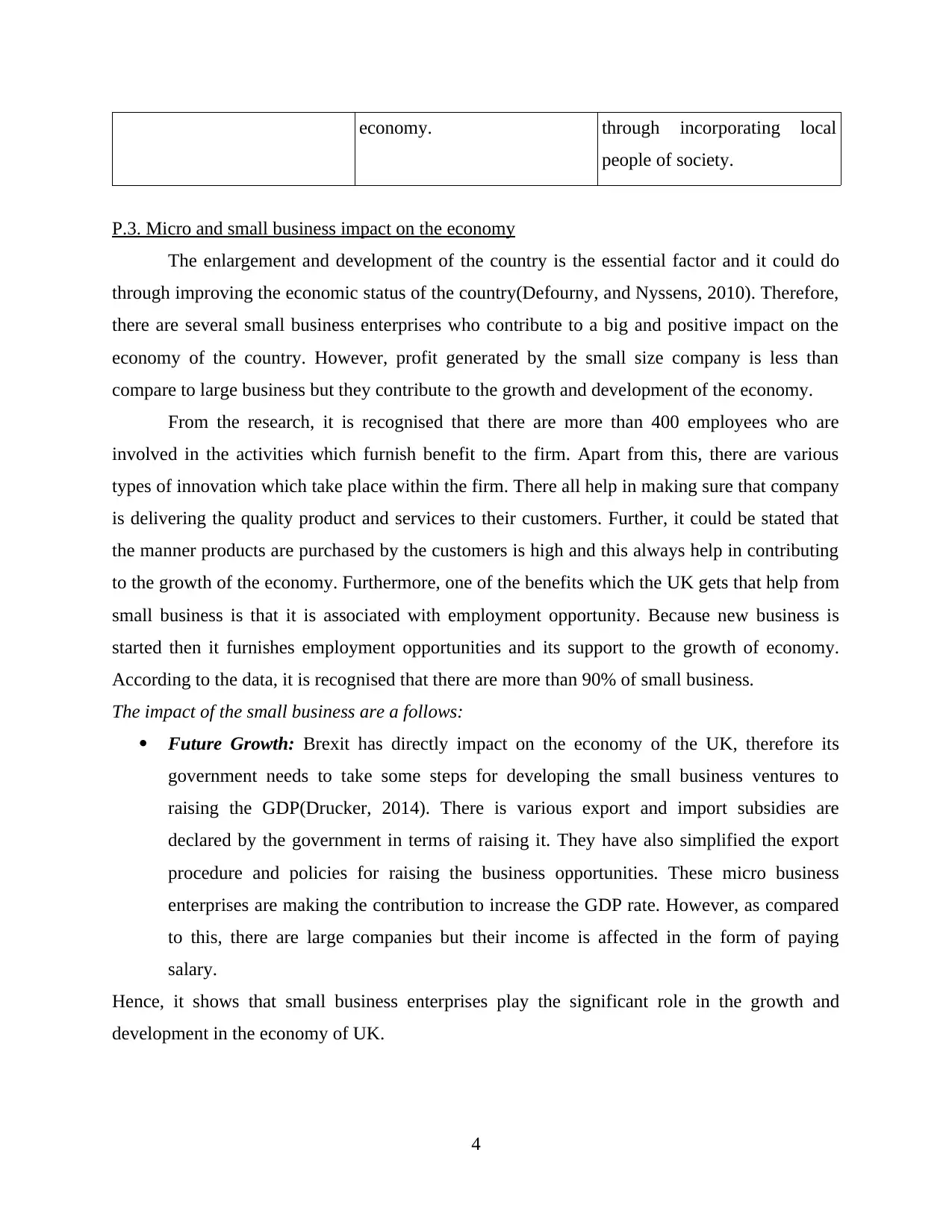
economy. through incorporating local
people of society.
P.3. Micro and small business impact on the economy
The enlargement and development of the country is the essential factor and it could do
through improving the economic status of the country(Defourny, and Nyssens, 2010). Therefore,
there are several small business enterprises who contribute to a big and positive impact on the
economy of the country. However, profit generated by the small size company is less than
compare to large business but they contribute to the growth and development of the economy.
From the research, it is recognised that there are more than 400 employees who are
involved in the activities which furnish benefit to the firm. Apart from this, there are various
types of innovation which take place within the firm. There all help in making sure that company
is delivering the quality product and services to their customers. Further, it could be stated that
the manner products are purchased by the customers is high and this always help in contributing
to the growth of the economy. Furthermore, one of the benefits which the UK gets that help from
small business is that it is associated with employment opportunity. Because new business is
started then it furnishes employment opportunities and its support to the growth of economy.
According to the data, it is recognised that there are more than 90% of small business.
The impact of the small business are a follows:
Future Growth: Brexit has directly impact on the economy of the UK, therefore its
government needs to take some steps for developing the small business ventures to
raising the GDP(Drucker, 2014). There is various export and import subsidies are
declared by the government in terms of raising it. They have also simplified the export
procedure and policies for raising the business opportunities. These micro business
enterprises are making the contribution to increase the GDP rate. However, as compared
to this, there are large companies but their income is affected in the form of paying
salary.
Hence, it shows that small business enterprises play the significant role in the growth and
development in the economy of UK.
4
people of society.
P.3. Micro and small business impact on the economy
The enlargement and development of the country is the essential factor and it could do
through improving the economic status of the country(Defourny, and Nyssens, 2010). Therefore,
there are several small business enterprises who contribute to a big and positive impact on the
economy of the country. However, profit generated by the small size company is less than
compare to large business but they contribute to the growth and development of the economy.
From the research, it is recognised that there are more than 400 employees who are
involved in the activities which furnish benefit to the firm. Apart from this, there are various
types of innovation which take place within the firm. There all help in making sure that company
is delivering the quality product and services to their customers. Further, it could be stated that
the manner products are purchased by the customers is high and this always help in contributing
to the growth of the economy. Furthermore, one of the benefits which the UK gets that help from
small business is that it is associated with employment opportunity. Because new business is
started then it furnishes employment opportunities and its support to the growth of economy.
According to the data, it is recognised that there are more than 90% of small business.
The impact of the small business are a follows:
Future Growth: Brexit has directly impact on the economy of the UK, therefore its
government needs to take some steps for developing the small business ventures to
raising the GDP(Drucker, 2014). There is various export and import subsidies are
declared by the government in terms of raising it. They have also simplified the export
procedure and policies for raising the business opportunities. These micro business
enterprises are making the contribution to increase the GDP rate. However, as compared
to this, there are large companies but their income is affected in the form of paying
salary.
Hence, it shows that small business enterprises play the significant role in the growth and
development in the economy of UK.
4
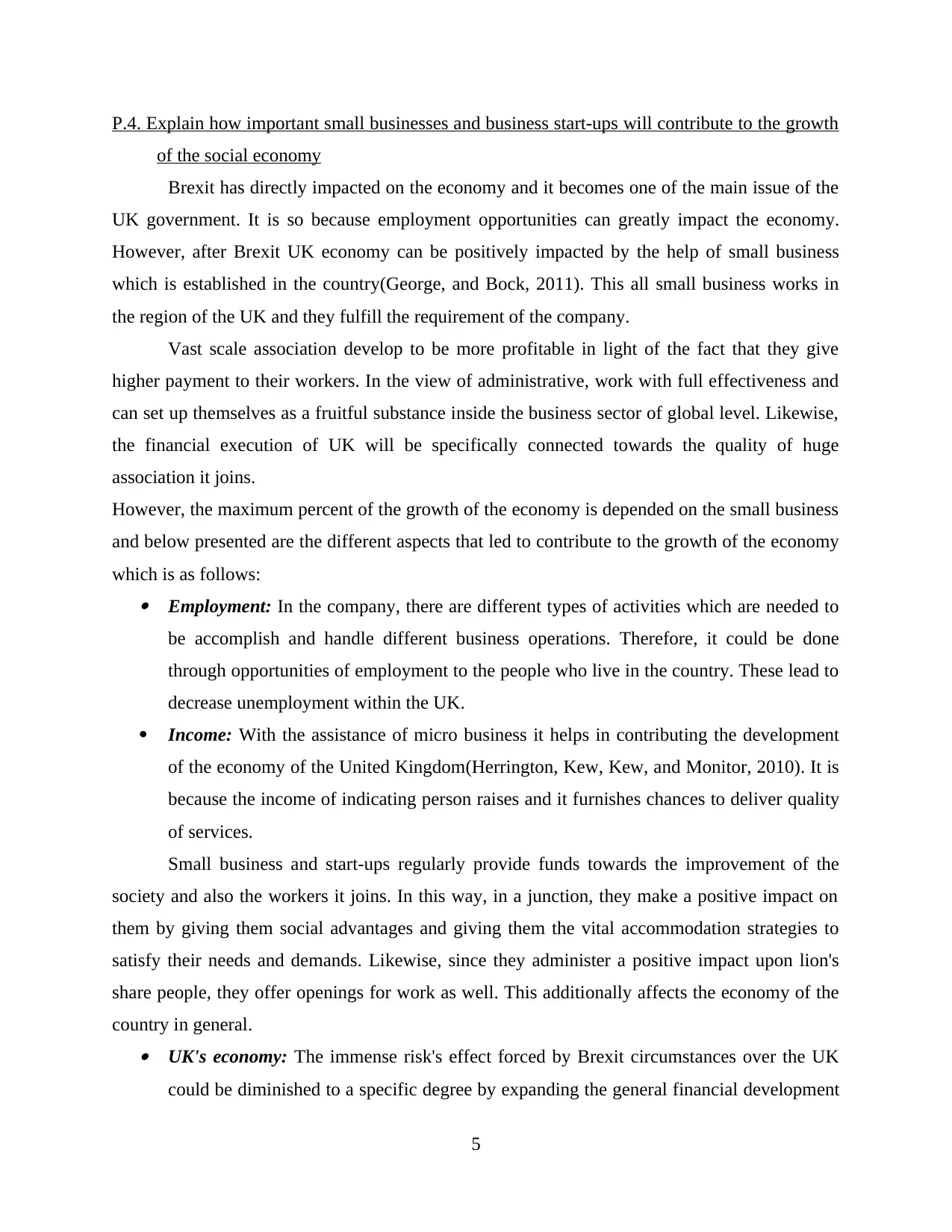
P.4. Explain how important small businesses and business start-ups will contribute to the growth
of the social economy
Brexit has directly impacted on the economy and it becomes one of the main issue of the
UK government. It is so because employment opportunities can greatly impact the economy.
However, after Brexit UK economy can be positively impacted by the help of small business
which is established in the country(George, and Bock, 2011). This all small business works in
the region of the UK and they fulfill the requirement of the company.
Vast scale association develop to be more profitable in light of the fact that they give
higher payment to their workers. In the view of administrative, work with full effectiveness and
can set up themselves as a fruitful substance inside the business sector of global level. Likewise,
the financial execution of UK will be specifically connected towards the quality of huge
association it joins.
However, the maximum percent of the growth of the economy is depended on the small business
and below presented are the different aspects that led to contribute to the growth of the economy
which is as follows: Employment: In the company, there are different types of activities which are needed to
be accomplish and handle different business operations. Therefore, it could be done
through opportunities of employment to the people who live in the country. These lead to
decrease unemployment within the UK.
Income: With the assistance of micro business it helps in contributing the development
of the economy of the United Kingdom(Herrington, Kew, Kew, and Monitor, 2010). It is
because the income of indicating person raises and it furnishes chances to deliver quality
of services.
Small business and start-ups regularly provide funds towards the improvement of the
society and also the workers it joins. In this way, in a junction, they make a positive impact on
them by giving them social advantages and giving them the vital accommodation strategies to
satisfy their needs and demands. Likewise, since they administer a positive impact upon lion's
share people, they offer openings for work as well. This additionally affects the economy of the
country in general. UK's economy: The immense risk's effect forced by Brexit circumstances over the UK
could be diminished to a specific degree by expanding the general financial development
5
of the social economy
Brexit has directly impacted on the economy and it becomes one of the main issue of the
UK government. It is so because employment opportunities can greatly impact the economy.
However, after Brexit UK economy can be positively impacted by the help of small business
which is established in the country(George, and Bock, 2011). This all small business works in
the region of the UK and they fulfill the requirement of the company.
Vast scale association develop to be more profitable in light of the fact that they give
higher payment to their workers. In the view of administrative, work with full effectiveness and
can set up themselves as a fruitful substance inside the business sector of global level. Likewise,
the financial execution of UK will be specifically connected towards the quality of huge
association it joins.
However, the maximum percent of the growth of the economy is depended on the small business
and below presented are the different aspects that led to contribute to the growth of the economy
which is as follows: Employment: In the company, there are different types of activities which are needed to
be accomplish and handle different business operations. Therefore, it could be done
through opportunities of employment to the people who live in the country. These lead to
decrease unemployment within the UK.
Income: With the assistance of micro business it helps in contributing the development
of the economy of the United Kingdom(Herrington, Kew, Kew, and Monitor, 2010). It is
because the income of indicating person raises and it furnishes chances to deliver quality
of services.
Small business and start-ups regularly provide funds towards the improvement of the
society and also the workers it joins. In this way, in a junction, they make a positive impact on
them by giving them social advantages and giving them the vital accommodation strategies to
satisfy their needs and demands. Likewise, since they administer a positive impact upon lion's
share people, they offer openings for work as well. This additionally affects the economy of the
country in general. UK's economy: The immense risk's effect forced by Brexit circumstances over the UK
could be diminished to a specific degree by expanding the general financial development
5
Paraphrase This Document
Need a fresh take? Get an instant paraphrase of this document with our AI Paraphraser
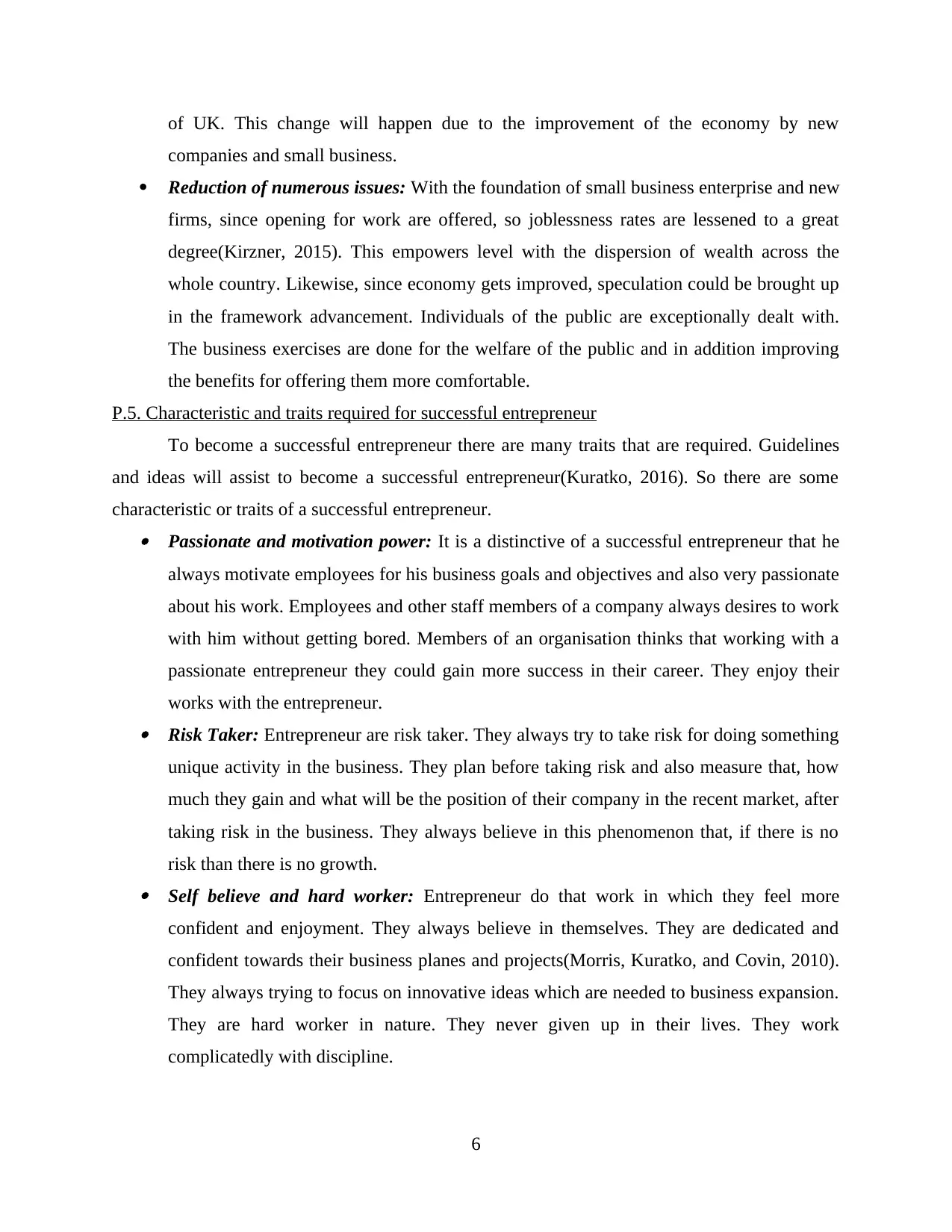
of UK. This change will happen due to the improvement of the economy by new
companies and small business.
Reduction of numerous issues: With the foundation of small business enterprise and new
firms, since opening for work are offered, so joblessness rates are lessened to a great
degree(Kirzner, 2015). This empowers level with the dispersion of wealth across the
whole country. Likewise, since economy gets improved, speculation could be brought up
in the framework advancement. Individuals of the public are exceptionally dealt with.
The business exercises are done for the welfare of the public and in addition improving
the benefits for offering them more comfortable.
P.5. Characteristic and traits required for successful entrepreneur
To become a successful entrepreneur there are many traits that are required. Guidelines
and ideas will assist to become a successful entrepreneur(Kuratko, 2016). So there are some
characteristic or traits of a successful entrepreneur. Passionate and motivation power: It is a distinctive of a successful entrepreneur that he
always motivate employees for his business goals and objectives and also very passionate
about his work. Employees and other staff members of a company always desires to work
with him without getting bored. Members of an organisation thinks that working with a
passionate entrepreneur they could gain more success in their career. They enjoy their
works with the entrepreneur. Risk Taker: Entrepreneur are risk taker. They always try to take risk for doing something
unique activity in the business. They plan before taking risk and also measure that, how
much they gain and what will be the position of their company in the recent market, after
taking risk in the business. They always believe in this phenomenon that, if there is no
risk than there is no growth. Self believe and hard worker: Entrepreneur do that work in which they feel more
confident and enjoyment. They always believe in themselves. They are dedicated and
confident towards their business planes and projects(Morris, Kuratko, and Covin, 2010).
They always trying to focus on innovative ideas which are needed to business expansion.
They are hard worker in nature. They never given up in their lives. They work
complicatedly with discipline.
6
companies and small business.
Reduction of numerous issues: With the foundation of small business enterprise and new
firms, since opening for work are offered, so joblessness rates are lessened to a great
degree(Kirzner, 2015). This empowers level with the dispersion of wealth across the
whole country. Likewise, since economy gets improved, speculation could be brought up
in the framework advancement. Individuals of the public are exceptionally dealt with.
The business exercises are done for the welfare of the public and in addition improving
the benefits for offering them more comfortable.
P.5. Characteristic and traits required for successful entrepreneur
To become a successful entrepreneur there are many traits that are required. Guidelines
and ideas will assist to become a successful entrepreneur(Kuratko, 2016). So there are some
characteristic or traits of a successful entrepreneur. Passionate and motivation power: It is a distinctive of a successful entrepreneur that he
always motivate employees for his business goals and objectives and also very passionate
about his work. Employees and other staff members of a company always desires to work
with him without getting bored. Members of an organisation thinks that working with a
passionate entrepreneur they could gain more success in their career. They enjoy their
works with the entrepreneur. Risk Taker: Entrepreneur are risk taker. They always try to take risk for doing something
unique activity in the business. They plan before taking risk and also measure that, how
much they gain and what will be the position of their company in the recent market, after
taking risk in the business. They always believe in this phenomenon that, if there is no
risk than there is no growth. Self believe and hard worker: Entrepreneur do that work in which they feel more
confident and enjoyment. They always believe in themselves. They are dedicated and
confident towards their business planes and projects(Morris, Kuratko, and Covin, 2010).
They always trying to focus on innovative ideas which are needed to business expansion.
They are hard worker in nature. They never given up in their lives. They work
complicatedly with discipline.
6
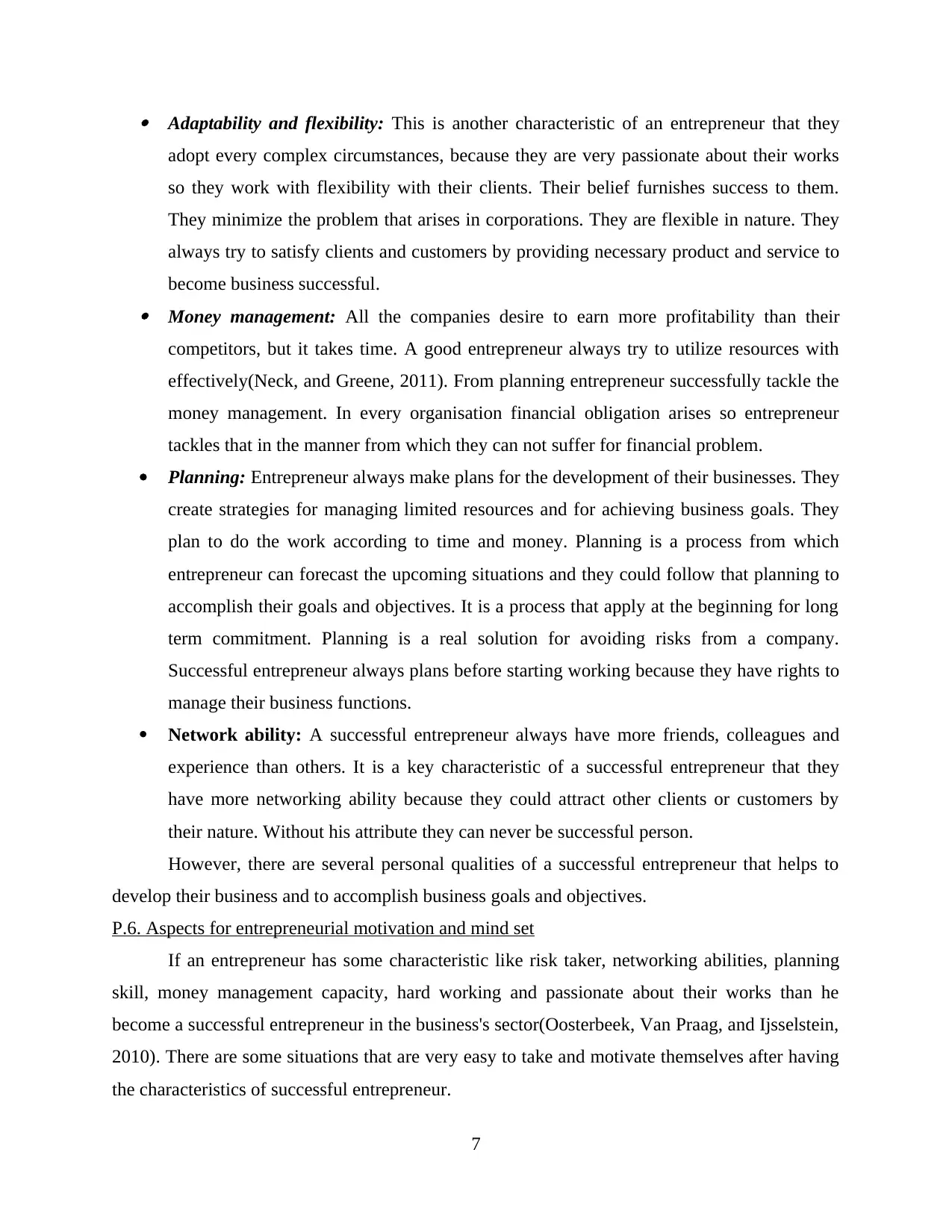
Adaptability and flexibility: This is another characteristic of an entrepreneur that they
adopt every complex circumstances, because they are very passionate about their works
so they work with flexibility with their clients. Their belief furnishes success to them.
They minimize the problem that arises in corporations. They are flexible in nature. They
always try to satisfy clients and customers by providing necessary product and service to
become business successful. Money management: All the companies desire to earn more profitability than their
competitors, but it takes time. A good entrepreneur always try to utilize resources with
effectively(Neck, and Greene, 2011). From planning entrepreneur successfully tackle the
money management. In every organisation financial obligation arises so entrepreneur
tackles that in the manner from which they can not suffer for financial problem.
Planning: Entrepreneur always make plans for the development of their businesses. They
create strategies for managing limited resources and for achieving business goals. They
plan to do the work according to time and money. Planning is a process from which
entrepreneur can forecast the upcoming situations and they could follow that planning to
accomplish their goals and objectives. It is a process that apply at the beginning for long
term commitment. Planning is a real solution for avoiding risks from a company.
Successful entrepreneur always plans before starting working because they have rights to
manage their business functions.
Network ability: A successful entrepreneur always have more friends, colleagues and
experience than others. It is a key characteristic of a successful entrepreneur that they
have more networking ability because they could attract other clients or customers by
their nature. Without his attribute they can never be successful person.
However, there are several personal qualities of a successful entrepreneur that helps to
develop their business and to accomplish business goals and objectives.
P.6. Aspects for entrepreneurial motivation and mind set
If an entrepreneur has some characteristic like risk taker, networking abilities, planning
skill, money management capacity, hard working and passionate about their works than he
become a successful entrepreneur in the business's sector(Oosterbeek, Van Praag, and Ijsselstein,
2010). There are some situations that are very easy to take and motivate themselves after having
the characteristics of successful entrepreneur.
7
adopt every complex circumstances, because they are very passionate about their works
so they work with flexibility with their clients. Their belief furnishes success to them.
They minimize the problem that arises in corporations. They are flexible in nature. They
always try to satisfy clients and customers by providing necessary product and service to
become business successful. Money management: All the companies desire to earn more profitability than their
competitors, but it takes time. A good entrepreneur always try to utilize resources with
effectively(Neck, and Greene, 2011). From planning entrepreneur successfully tackle the
money management. In every organisation financial obligation arises so entrepreneur
tackles that in the manner from which they can not suffer for financial problem.
Planning: Entrepreneur always make plans for the development of their businesses. They
create strategies for managing limited resources and for achieving business goals. They
plan to do the work according to time and money. Planning is a process from which
entrepreneur can forecast the upcoming situations and they could follow that planning to
accomplish their goals and objectives. It is a process that apply at the beginning for long
term commitment. Planning is a real solution for avoiding risks from a company.
Successful entrepreneur always plans before starting working because they have rights to
manage their business functions.
Network ability: A successful entrepreneur always have more friends, colleagues and
experience than others. It is a key characteristic of a successful entrepreneur that they
have more networking ability because they could attract other clients or customers by
their nature. Without his attribute they can never be successful person.
However, there are several personal qualities of a successful entrepreneur that helps to
develop their business and to accomplish business goals and objectives.
P.6. Aspects for entrepreneurial motivation and mind set
If an entrepreneur has some characteristic like risk taker, networking abilities, planning
skill, money management capacity, hard working and passionate about their works than he
become a successful entrepreneur in the business's sector(Oosterbeek, Van Praag, and Ijsselstein,
2010). There are some situations that are very easy to take and motivate themselves after having
the characteristics of successful entrepreneur.
7
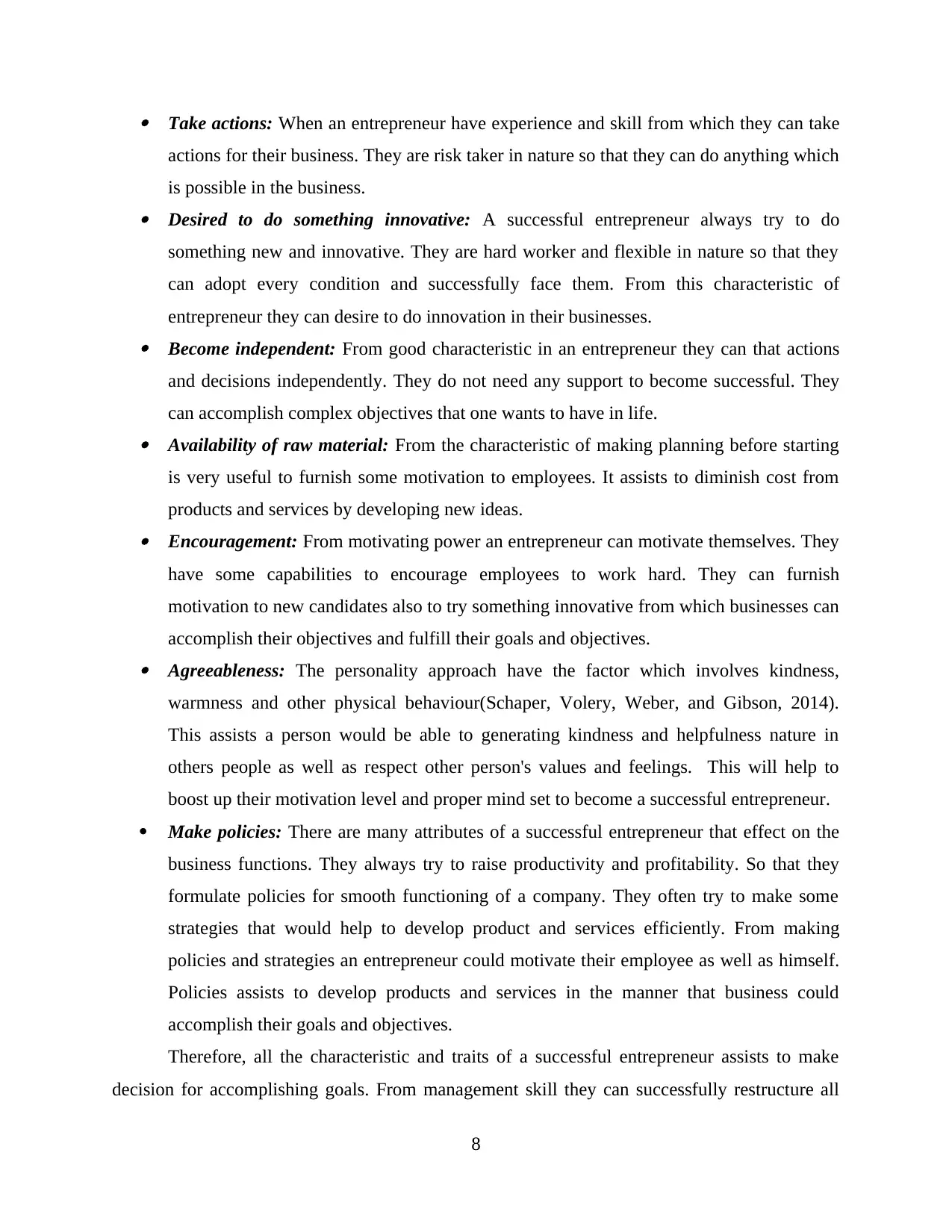
Take actions: When an entrepreneur have experience and skill from which they can take
actions for their business. They are risk taker in nature so that they can do anything which
is possible in the business. Desired to do something innovative: A successful entrepreneur always try to do
something new and innovative. They are hard worker and flexible in nature so that they
can adopt every condition and successfully face them. From this characteristic of
entrepreneur they can desire to do innovation in their businesses. Become independent: From good characteristic in an entrepreneur they can that actions
and decisions independently. They do not need any support to become successful. They
can accomplish complex objectives that one wants to have in life. Availability of raw material: From the characteristic of making planning before starting
is very useful to furnish some motivation to employees. It assists to diminish cost from
products and services by developing new ideas. Encouragement: From motivating power an entrepreneur can motivate themselves. They
have some capabilities to encourage employees to work hard. They can furnish
motivation to new candidates also to try something innovative from which businesses can
accomplish their objectives and fulfill their goals and objectives. Agreeableness: The personality approach have the factor which involves kindness,
warmness and other physical behaviour(Schaper, Volery, Weber, and Gibson, 2014).
This assists a person would be able to generating kindness and helpfulness nature in
others people as well as respect other person's values and feelings. This will help to
boost up their motivation level and proper mind set to become a successful entrepreneur.
Make policies: There are many attributes of a successful entrepreneur that effect on the
business functions. They always try to raise productivity and profitability. So that they
formulate policies for smooth functioning of a company. They often try to make some
strategies that would help to develop product and services efficiently. From making
policies and strategies an entrepreneur could motivate their employee as well as himself.
Policies assists to develop products and services in the manner that business could
accomplish their goals and objectives.
Therefore, all the characteristic and traits of a successful entrepreneur assists to make
decision for accomplishing goals. From management skill they can successfully restructure all
8
actions for their business. They are risk taker in nature so that they can do anything which
is possible in the business. Desired to do something innovative: A successful entrepreneur always try to do
something new and innovative. They are hard worker and flexible in nature so that they
can adopt every condition and successfully face them. From this characteristic of
entrepreneur they can desire to do innovation in their businesses. Become independent: From good characteristic in an entrepreneur they can that actions
and decisions independently. They do not need any support to become successful. They
can accomplish complex objectives that one wants to have in life. Availability of raw material: From the characteristic of making planning before starting
is very useful to furnish some motivation to employees. It assists to diminish cost from
products and services by developing new ideas. Encouragement: From motivating power an entrepreneur can motivate themselves. They
have some capabilities to encourage employees to work hard. They can furnish
motivation to new candidates also to try something innovative from which businesses can
accomplish their objectives and fulfill their goals and objectives. Agreeableness: The personality approach have the factor which involves kindness,
warmness and other physical behaviour(Schaper, Volery, Weber, and Gibson, 2014).
This assists a person would be able to generating kindness and helpfulness nature in
others people as well as respect other person's values and feelings. This will help to
boost up their motivation level and proper mind set to become a successful entrepreneur.
Make policies: There are many attributes of a successful entrepreneur that effect on the
business functions. They always try to raise productivity and profitability. So that they
formulate policies for smooth functioning of a company. They often try to make some
strategies that would help to develop product and services efficiently. From making
policies and strategies an entrepreneur could motivate their employee as well as himself.
Policies assists to develop products and services in the manner that business could
accomplish their goals and objectives.
Therefore, all the characteristic and traits of a successful entrepreneur assists to make
decision for accomplishing goals. From management skill they can successfully restructure all
8
Secure Best Marks with AI Grader
Need help grading? Try our AI Grader for instant feedback on your assignments.
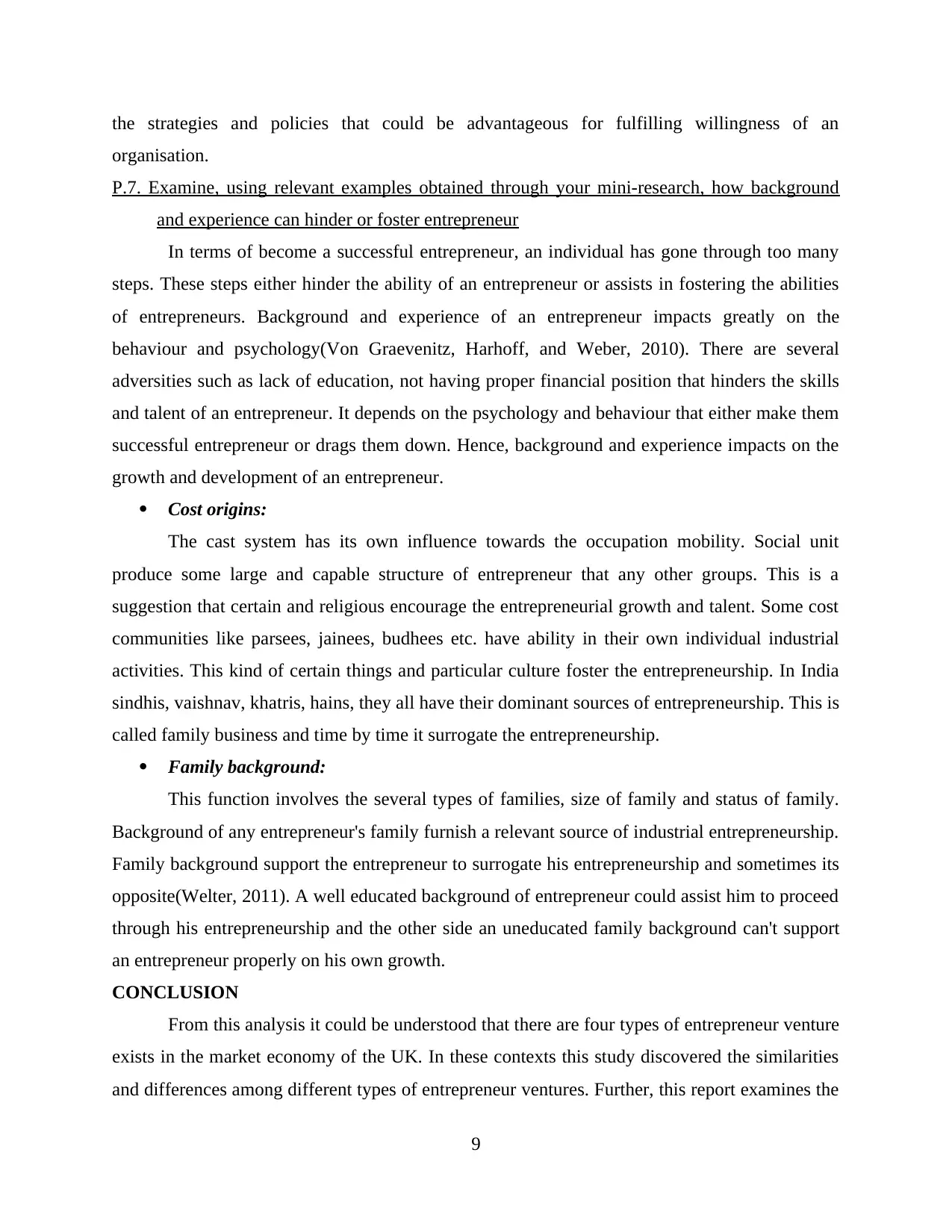
the strategies and policies that could be advantageous for fulfilling willingness of an
organisation.
P.7. Examine, using relevant examples obtained through your mini-research, how background
and experience can hinder or foster entrepreneur
In terms of become a successful entrepreneur, an individual has gone through too many
steps. These steps either hinder the ability of an entrepreneur or assists in fostering the abilities
of entrepreneurs. Background and experience of an entrepreneur impacts greatly on the
behaviour and psychology(Von Graevenitz, Harhoff, and Weber, 2010). There are several
adversities such as lack of education, not having proper financial position that hinders the skills
and talent of an entrepreneur. It depends on the psychology and behaviour that either make them
successful entrepreneur or drags them down. Hence, background and experience impacts on the
growth and development of an entrepreneur.
Cost origins:
The cast system has its own influence towards the occupation mobility. Social unit
produce some large and capable structure of entrepreneur that any other groups. This is a
suggestion that certain and religious encourage the entrepreneurial growth and talent. Some cost
communities like parsees, jainees, budhees etc. have ability in their own individual industrial
activities. This kind of certain things and particular culture foster the entrepreneurship. In India
sindhis, vaishnav, khatris, hains, they all have their dominant sources of entrepreneurship. This is
called family business and time by time it surrogate the entrepreneurship.
Family background:
This function involves the several types of families, size of family and status of family.
Background of any entrepreneur's family furnish a relevant source of industrial entrepreneurship.
Family background support the entrepreneur to surrogate his entrepreneurship and sometimes its
opposite(Welter, 2011). A well educated background of entrepreneur could assist him to proceed
through his entrepreneurship and the other side an uneducated family background can't support
an entrepreneur properly on his own growth.
CONCLUSION
From this analysis it could be understood that there are four types of entrepreneur venture
exists in the market economy of the UK. In these contexts this study discovered the similarities
and differences among different types of entrepreneur ventures. Further, this report examines the
9
organisation.
P.7. Examine, using relevant examples obtained through your mini-research, how background
and experience can hinder or foster entrepreneur
In terms of become a successful entrepreneur, an individual has gone through too many
steps. These steps either hinder the ability of an entrepreneur or assists in fostering the abilities
of entrepreneurs. Background and experience of an entrepreneur impacts greatly on the
behaviour and psychology(Von Graevenitz, Harhoff, and Weber, 2010). There are several
adversities such as lack of education, not having proper financial position that hinders the skills
and talent of an entrepreneur. It depends on the psychology and behaviour that either make them
successful entrepreneur or drags them down. Hence, background and experience impacts on the
growth and development of an entrepreneur.
Cost origins:
The cast system has its own influence towards the occupation mobility. Social unit
produce some large and capable structure of entrepreneur that any other groups. This is a
suggestion that certain and religious encourage the entrepreneurial growth and talent. Some cost
communities like parsees, jainees, budhees etc. have ability in their own individual industrial
activities. This kind of certain things and particular culture foster the entrepreneurship. In India
sindhis, vaishnav, khatris, hains, they all have their dominant sources of entrepreneurship. This is
called family business and time by time it surrogate the entrepreneurship.
Family background:
This function involves the several types of families, size of family and status of family.
Background of any entrepreneur's family furnish a relevant source of industrial entrepreneurship.
Family background support the entrepreneur to surrogate his entrepreneurship and sometimes its
opposite(Welter, 2011). A well educated background of entrepreneur could assist him to proceed
through his entrepreneurship and the other side an uneducated family background can't support
an entrepreneur properly on his own growth.
CONCLUSION
From this analysis it could be understood that there are four types of entrepreneur venture
exists in the market economy of the UK. In these contexts this study discovered the similarities
and differences among different types of entrepreneur ventures. Further, this report examines the
9
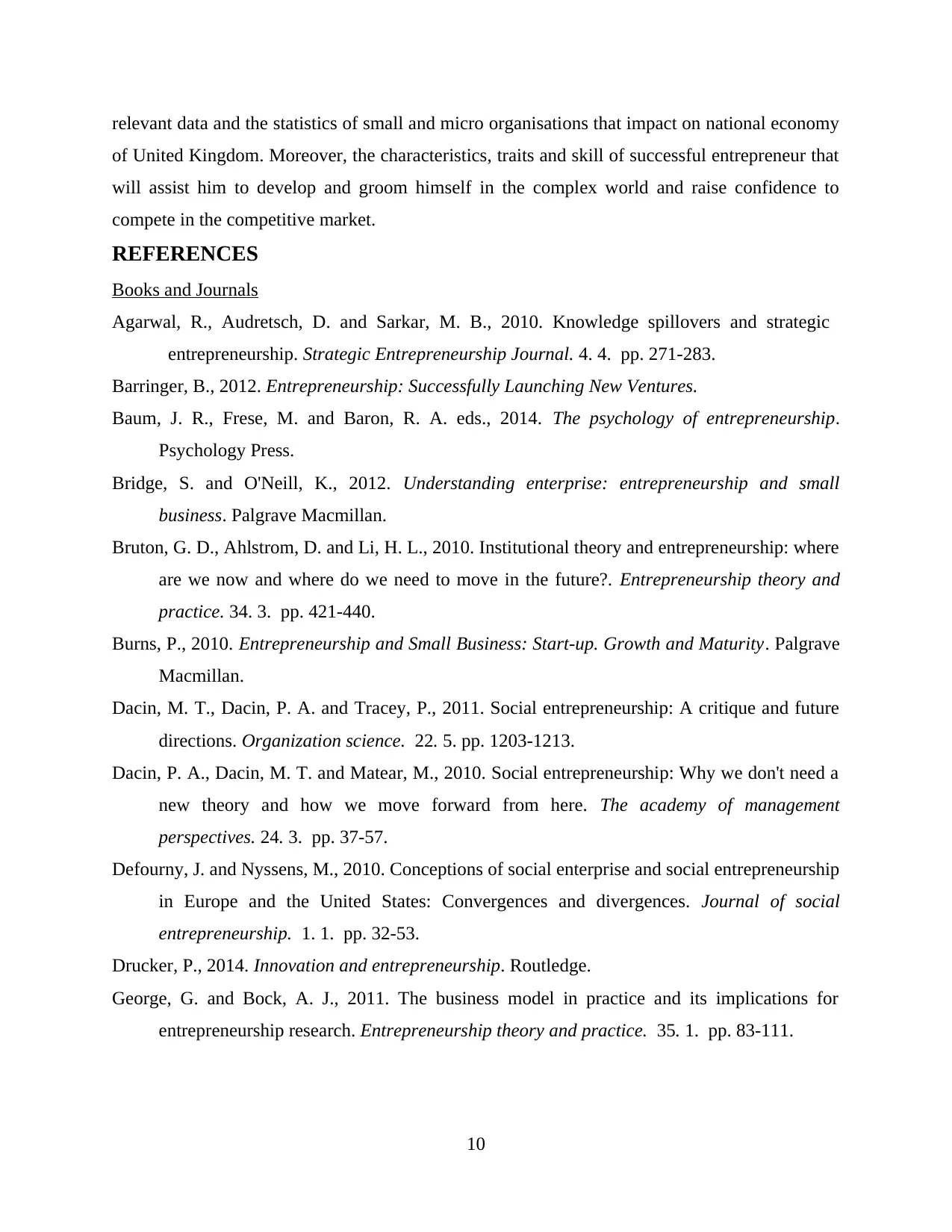
relevant data and the statistics of small and micro organisations that impact on national economy
of United Kingdom. Moreover, the characteristics, traits and skill of successful entrepreneur that
will assist him to develop and groom himself in the complex world and raise confidence to
compete in the competitive market.
REFERENCES
Books and Journals
Agarwal, R., Audretsch, D. and Sarkar, M. B., 2010. Knowledge spillovers and strategic
entrepreneurship. Strategic Entrepreneurship Journal. 4. 4. pp. 271-283.
Barringer, B., 2012. Entrepreneurship: Successfully Launching New Ventures.
Baum, J. R., Frese, M. and Baron, R. A. eds., 2014. The psychology of entrepreneurship.
Psychology Press.
Bridge, S. and O'Neill, K., 2012. Understanding enterprise: entrepreneurship and small
business. Palgrave Macmillan.
Bruton, G. D., Ahlstrom, D. and Li, H. L., 2010. Institutional theory and entrepreneurship: where
are we now and where do we need to move in the future?. Entrepreneurship theory and
practice. 34. 3. pp. 421-440.
Burns, P., 2010. Entrepreneurship and Small Business: Start-up. Growth and Maturity. Palgrave
Macmillan.
Dacin, M. T., Dacin, P. A. and Tracey, P., 2011. Social entrepreneurship: A critique and future
directions. Organization science. 22. 5. pp. 1203-1213.
Dacin, P. A., Dacin, M. T. and Matear, M., 2010. Social entrepreneurship: Why we don't need a
new theory and how we move forward from here. The academy of management
perspectives. 24. 3. pp. 37-57.
Defourny, J. and Nyssens, M., 2010. Conceptions of social enterprise and social entrepreneurship
in Europe and the United States: Convergences and divergences. Journal of social
entrepreneurship. 1. 1. pp. 32-53.
Drucker, P., 2014. Innovation and entrepreneurship. Routledge.
George, G. and Bock, A. J., 2011. The business model in practice and its implications for
entrepreneurship research. Entrepreneurship theory and practice. 35. 1. pp. 83-111.
10
of United Kingdom. Moreover, the characteristics, traits and skill of successful entrepreneur that
will assist him to develop and groom himself in the complex world and raise confidence to
compete in the competitive market.
REFERENCES
Books and Journals
Agarwal, R., Audretsch, D. and Sarkar, M. B., 2010. Knowledge spillovers and strategic
entrepreneurship. Strategic Entrepreneurship Journal. 4. 4. pp. 271-283.
Barringer, B., 2012. Entrepreneurship: Successfully Launching New Ventures.
Baum, J. R., Frese, M. and Baron, R. A. eds., 2014. The psychology of entrepreneurship.
Psychology Press.
Bridge, S. and O'Neill, K., 2012. Understanding enterprise: entrepreneurship and small
business. Palgrave Macmillan.
Bruton, G. D., Ahlstrom, D. and Li, H. L., 2010. Institutional theory and entrepreneurship: where
are we now and where do we need to move in the future?. Entrepreneurship theory and
practice. 34. 3. pp. 421-440.
Burns, P., 2010. Entrepreneurship and Small Business: Start-up. Growth and Maturity. Palgrave
Macmillan.
Dacin, M. T., Dacin, P. A. and Tracey, P., 2011. Social entrepreneurship: A critique and future
directions. Organization science. 22. 5. pp. 1203-1213.
Dacin, P. A., Dacin, M. T. and Matear, M., 2010. Social entrepreneurship: Why we don't need a
new theory and how we move forward from here. The academy of management
perspectives. 24. 3. pp. 37-57.
Defourny, J. and Nyssens, M., 2010. Conceptions of social enterprise and social entrepreneurship
in Europe and the United States: Convergences and divergences. Journal of social
entrepreneurship. 1. 1. pp. 32-53.
Drucker, P., 2014. Innovation and entrepreneurship. Routledge.
George, G. and Bock, A. J., 2011. The business model in practice and its implications for
entrepreneurship research. Entrepreneurship theory and practice. 35. 1. pp. 83-111.
10
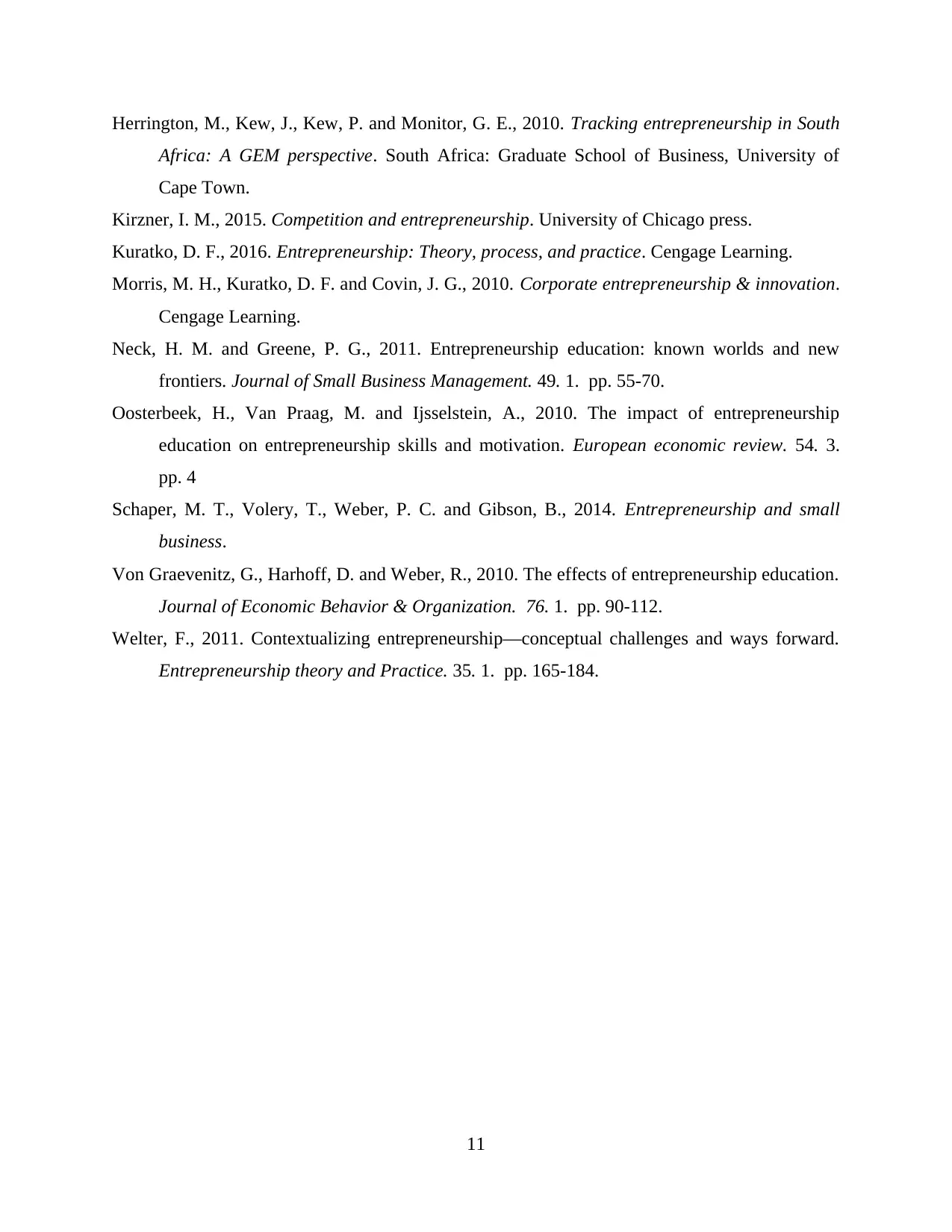
Herrington, M., Kew, J., Kew, P. and Monitor, G. E., 2010. Tracking entrepreneurship in South
Africa: A GEM perspective. South Africa: Graduate School of Business, University of
Cape Town.
Kirzner, I. M., 2015. Competition and entrepreneurship. University of Chicago press.
Kuratko, D. F., 2016. Entrepreneurship: Theory, process, and practice. Cengage Learning.
Morris, M. H., Kuratko, D. F. and Covin, J. G., 2010. Corporate entrepreneurship & innovation.
Cengage Learning.
Neck, H. M. and Greene, P. G., 2011. Entrepreneurship education: known worlds and new
frontiers. Journal of Small Business Management. 49. 1. pp. 55-70.
Oosterbeek, H., Van Praag, M. and Ijsselstein, A., 2010. The impact of entrepreneurship
education on entrepreneurship skills and motivation. European economic review. 54. 3.
pp. 4
Schaper, M. T., Volery, T., Weber, P. C. and Gibson, B., 2014. Entrepreneurship and small
business.
Von Graevenitz, G., Harhoff, D. and Weber, R., 2010. The effects of entrepreneurship education.
Journal of Economic Behavior & Organization. 76. 1. pp. 90-112.
Welter, F., 2011. Contextualizing entrepreneurship—conceptual challenges and ways forward.
Entrepreneurship theory and Practice. 35. 1. pp. 165-184.
11
Africa: A GEM perspective. South Africa: Graduate School of Business, University of
Cape Town.
Kirzner, I. M., 2015. Competition and entrepreneurship. University of Chicago press.
Kuratko, D. F., 2016. Entrepreneurship: Theory, process, and practice. Cengage Learning.
Morris, M. H., Kuratko, D. F. and Covin, J. G., 2010. Corporate entrepreneurship & innovation.
Cengage Learning.
Neck, H. M. and Greene, P. G., 2011. Entrepreneurship education: known worlds and new
frontiers. Journal of Small Business Management. 49. 1. pp. 55-70.
Oosterbeek, H., Van Praag, M. and Ijsselstein, A., 2010. The impact of entrepreneurship
education on entrepreneurship skills and motivation. European economic review. 54. 3.
pp. 4
Schaper, M. T., Volery, T., Weber, P. C. and Gibson, B., 2014. Entrepreneurship and small
business.
Von Graevenitz, G., Harhoff, D. and Weber, R., 2010. The effects of entrepreneurship education.
Journal of Economic Behavior & Organization. 76. 1. pp. 90-112.
Welter, F., 2011. Contextualizing entrepreneurship—conceptual challenges and ways forward.
Entrepreneurship theory and Practice. 35. 1. pp. 165-184.
11
1 out of 13
Related Documents
Your All-in-One AI-Powered Toolkit for Academic Success.
+13062052269
info@desklib.com
Available 24*7 on WhatsApp / Email
![[object Object]](/_next/static/media/star-bottom.7253800d.svg)
Unlock your academic potential
© 2024 | Zucol Services PVT LTD | All rights reserved.





